-
 Bitcoin
Bitcoin $104,093.1199
0.77% -
 Ethereum
Ethereum $2,508.1404
-0.13% -
 Tether USDt
Tether USDt $1.0000
0.00% -
 XRP
XRP $2.3627
-2.50% -
 BNB
BNB $650.6914
-0.72% -
 Solana
Solana $172.3789
-0.62% -
 USDC
USDC $0.9998
-0.01% -
 Dogecoin
Dogecoin $0.2312
-3.01% -
 Cardano
Cardano $0.8091
-1.58% -
 TRON
TRON $0.2647
1.37% -
 Sui
Sui $4.0149
-0.58% -
 Chainlink
Chainlink $16.9853
-0.04% -
 Avalanche
Avalanche $24.6408
-3.09% -
 Stellar
Stellar $0.3074
-0.88% -
 Shiba Inu
Shiba Inu $0.0...01585
-1.53% -
 Hedera
Hedera $0.2059
-3.84% -
 Toncoin
Toncoin $3.3636
-1.19% -
 Hyperliquid
Hyperliquid $24.9497
-1.85% -
 Bitcoin Cash
Bitcoin Cash $409.0966
-3.20% -
 Polkadot
Polkadot $5.0928
-0.77% -
 Pi
Pi $1.1100
50.04% -
 UNUS SED LEO
UNUS SED LEO $8.3637
-2.10% -
 Litecoin
Litecoin $99.9699
-3.90% -
 Monero
Monero $334.1963
3.85% -
 Pepe
Pepe $0.0...01356
2.26% -
 Bitget Token
Bitget Token $4.8622
0.08% -
 Dai
Dai $0.9999
-0.01% -
 Ethena USDe
Ethena USDe $1.0002
-0.01% -
 Uniswap
Uniswap $6.9041
-0.32% -
 Bittensor
Bittensor $452.3936
-1.53%
What is the format of the Dogecoin wallet address?
Dogecoin addresses, alphanumeric strings based on Base58Check encoding, represent unique public keys on the blockchain. Their format, while varying slightly between wallets, ensures data integrity and aids in preventing transaction errors and scams.
Feb 28, 2025 at 04:18 am

What is the format of the Dogecoin wallet address? A Deep Dive into Dogecoin Wallet Addresses and Their Functionality
Key Points:
- Dogecoin wallet addresses, like those for other cryptocurrencies, are essentially alphanumeric strings representing a unique public key on the Dogecoin blockchain. Understanding their format is crucial for secure and efficient transactions.
- The format is based on the underlying cryptographic principles of the Dogecoin network, specifically the Base58Check encoding scheme. This ensures data integrity and error detection.
- Different Dogecoin wallets may display the address in slightly different formats, but the core alphanumeric string remains consistent.
- Security considerations, such as address verification and avoiding phishing scams, are paramount when dealing with Dogecoin addresses.
Understanding Dogecoin Wallet Addresses:
- The Core Structure: A Dogecoin wallet address isn't a random string of characters; it's a carefully constructed identifier derived from a public key. This public key, in turn, is linked to a private key that grants access to the Dogecoin associated with that address. The process involves cryptographic hashing and encoding to ensure data integrity and security. The core structure is built upon the Base58Check encoding, a method designed to minimize the risk of errors caused by visually similar characters. This encoding transforms a raw cryptographic hash into a string that is more user-friendly and less prone to human error during manual entry. The Base58 alphabet consists of uppercase and lowercase letters, numbers 0-9, and excludes characters such as 0 (zero), O (uppercase O), I (uppercase I), and l (lowercase L) to reduce ambiguity. This careful selection minimizes the chance of misinterpreting the address, which could lead to irreversible loss of funds. The 'Check' part of Base58Check refers to an error-detection mechanism embedded within the encoded string. This allows recipients to verify the address's integrity, reducing the likelihood of typos or malicious alterations leading to the loss of funds. The check ensures that any errors introduced during copying or transmission are immediately flagged. The process starts with the public key, which is a large number, then a cryptographic hash function (like SHA-256) is applied. This produces a fixed-size hash, which is then further processed and encoded using Base58. The resulting string is the Dogecoin address that you see and use for transactions.
- Visual Representation and Variations: While the underlying structure is consistent, the visual representation of a Dogecoin address might differ slightly depending on the wallet software or platform used. Some wallets may prefix the address with a label, such as "DOGE:" or similar identifiers. Others might include additional information, like a QR code for easy scanning. However, the core alphanumeric string representing the Base58Check encoded public key remains the same across all legitimate representations. Variations may also arise from the wallet's implementation of the Base58Check encoding. While the core algorithm is standardized, minor differences in implementation details can occasionally lead to subtly different address formats. These differences are usually insignificant and should not affect the functionality of the address. The crucial aspect is that the address, regardless of minor variations in presentation, accurately reflects the underlying public key and its corresponding private key. Any discrepancy between the address displayed by the wallet and the address used for sending or receiving Dogecoin should be investigated immediately as this could indicate a security issue or a potential scam.
- Security Implications and Best Practices: The format itself is not a security feature, but rather a mechanism for representing the public key in a user-friendly manner. True security relies on the proper handling of the associated private key. Never share your private key with anyone. This key grants complete control over the Dogecoin associated with the address. If your private key is compromised, your funds are at risk. Always verify the address before sending Dogecoin. Double-check the address against the recipient's publicly displayed address to prevent accidental or malicious misdirection of funds. Use reputable Dogecoin wallets and exchanges. Choose wallets and exchanges with a strong track record of security and user protection. Avoid using unofficial or poorly reviewed platforms, as these are more likely to be vulnerable to hacking or scams. Be wary of phishing attempts. Phishing scams often involve fraudulent websites or emails that mimic legitimate Dogecoin platforms. These scams aim to steal your private keys or wallet information. Always verify the authenticity of any website or email before entering your sensitive information. Regularly back up your wallet. Losing access to your wallet can mean losing your Dogecoin. Regularly back up your wallet data to a secure location, using multiple backup methods. This ensures you can recover your access even if one backup method fails. Consider using a hardware wallet. Hardware wallets offer a high degree of security by storing your private keys offline, reducing the risk of hacking or malware attacks.
- Error Detection and Prevention: The Base58Check encoding within the Dogecoin address format includes a checksum mechanism that allows for error detection. This is crucial for preventing accidental or malicious alteration of the address, which could result in the loss of funds. If a single character is altered, the checksum will fail verification, alerting the recipient to the potential error. This error-detection mechanism is an integral part of the Dogecoin protocol and significantly reduces the likelihood of accidental fund loss due to typing errors. However, relying solely on the error-detection mechanism is insufficient. Careful manual verification and utilizing tools such as QR code scanners are also recommended to minimize errors during address input. The combination of visual confirmation, checksum verification, and careful data entry significantly enhances the security and reliability of Dogecoin transactions. Moreover, understanding the format itself helps users identify potential phishing scams or fraudulent addresses. Deviations from the standard alphanumeric format, such as unusual characters or unexpected prefixes, can often be indicators of fraudulent activity. Staying vigilant and understanding the basics of the Dogecoin address format enhances overall security.
FAQs:
Q: What does a typical Dogecoin address look like?
A: A typical Dogecoin address is a long string of alphanumeric characters (uppercase and lowercase letters, and numbers 0-9), typically starting with a "D". The exact length can vary slightly but is usually around 34 characters. It's crucial to remember that the specific visual representation can vary slightly based on the wallet software, but the core alphanumeric string remains consistent.
Q: Can I create my own Dogecoin address?
A: No, you cannot directly create a Dogecoin address. The address is derived from a cryptographic process involving your private key and public key. You obtain a Dogecoin address when you create a wallet. The wallet software handles the complex cryptographic calculations necessary to generate the address.
Q: Is it safe to share my Dogecoin address?
A: Sharing your Dogecoin address is generally safe, as it is a public key, analogous to your bank account number. However, never share your private key, which is what grants access to your funds.
Q: What happens if I make a mistake typing my Dogecoin address?
A: If you make a mistake typing your Dogecoin address, the transaction might fail, or worse, your Dogecoin could be sent to the wrong address. There's no way to recover Dogecoin sent to an incorrect address. Always double-check the address before confirming any transaction.
Q: How can I verify a Dogecoin address?
A: While you cannot directly "verify" an address in the sense of confirming its ownership, you can verify that it conforms to the expected format (a long alphanumeric string, typically starting with "D"). Also, compare the address meticulously with the recipient's publicly displayed address before sending any Dogecoin. If the address looks suspicious or doesn't match, do not send funds.
Q: What are the consequences of using an incorrect Dogecoin address?
A: Using an incorrect Dogecoin address can result in the irreversible loss of your funds. The Dogecoin will be sent to the incorrect address, and you will likely have no way to retrieve it. This highlights the critical importance of carefully verifying the address before sending any Dogecoin. Double-checking and using QR code scanners are highly recommended to prevent this type of error.
Q: Are all Dogecoin addresses the same length?
A: While Dogecoin addresses generally have a similar length (around 34 characters), slight variations can occur depending on the wallet software and its implementation of the Base58Check encoding. The key is not the exact length, but the overall format and the verification of the address against the recipient's publicly displayed address.
Q: Can I change my Dogecoin address?
A: You cannot change your existing Dogecoin address. Each address is linked to a specific set of private and public keys. If you need a new address, you would generate a new wallet or a new receiving address within your existing wallet. This will create a new address with a new set of keys, keeping your existing Dogecoin safe.
Q: What if I lose access to my Dogecoin wallet?
A: Losing access to your Dogecoin wallet can mean losing access to your Dogecoin. Regularly backing up your wallet data is essential. Depending on the type of wallet (software or hardware), different recovery methods may be available. If you used a strong password and employed multiple backup methods, the chances of recovering your wallet and your Dogecoin increase significantly.
Q: How can I protect my Dogecoin address and private key?
A: Protecting your Dogecoin address and private key is paramount. Never share your private key with anyone. Use strong and unique passwords for your wallet and any associated accounts. Be wary of phishing attempts and only use reputable wallets and exchanges. Consider using a hardware wallet for enhanced security, as it stores your private keys offline. Regularly back up your wallet data to multiple secure locations. These steps will significantly reduce the risk of unauthorized access to your Dogecoin.
Disclaimer:info@kdj.com
The information provided is not trading advice. kdj.com does not assume any responsibility for any investments made based on the information provided in this article. Cryptocurrencies are highly volatile and it is highly recommended that you invest with caution after thorough research!
If you believe that the content used on this website infringes your copyright, please contact us immediately (info@kdj.com) and we will delete it promptly.
- Ethereum (ETH) Often Follows Bitcoin's Market Trends
- 2025-05-12 06:10:13
- What’s the Best Crypto to Buy Now? It’s Not BTC, ETH, or XRP — It’s Priced at Just $0.025
- 2025-05-12 06:10:13
- Can One Token Deliver AI Automation, DeFi Rewards, and 100x Potential? Introducing Unstaked ($UNSD)
- 2025-05-12 06:05:14
- Can Pepe’s rally or Litecoin’s breakout deliver better short-term gains than a daily 100M BDAG prize pool?
- 2025-05-12 06:05:14
- XRP is turning heads again following an impressive show of resilience
- 2025-05-12 06:00:22
- As Momentum Fades From Pi Coin, Investors Are Turning Their Attention To Lightchain AI
- 2025-05-12 06:00:22
Related knowledge
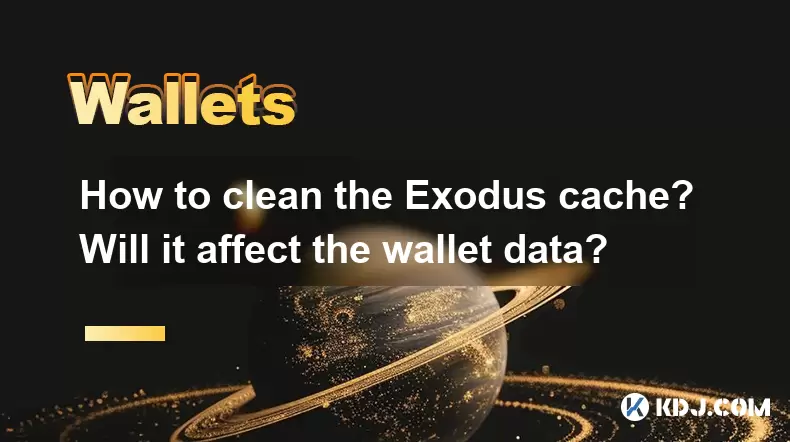
How to clean the Exodus cache? Will it affect the wallet data?
May 11,2025 at 12:49pm
Cleaning the cache in the Exodus wallet is a routine maintenance task that can help improve the performance of the application. However, many users are concerned about whether this action will affect their wallet data. In this article, we will guide you through the process of cleaning the Exodus cache and explain why it does not impact your wallet data....
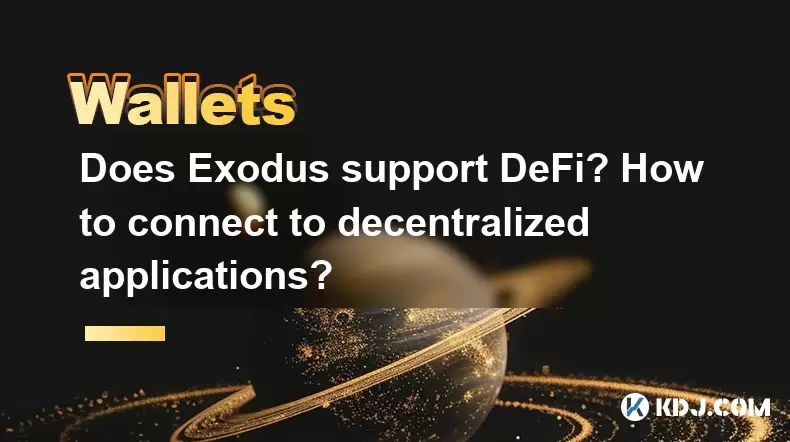
Does Exodus support DeFi? How to connect to decentralized applications?
May 10,2025 at 08:36pm
Does Exodus Support DeFi? How to Connect to Decentralized Applications? Exodus is a popular cryptocurrency wallet known for its user-friendly interface and support for a wide range of cryptocurrencies. However, one of the frequently asked questions among users is whether Exodus supports DeFi (Decentralized Finance) and how to connect to decentralized ap...
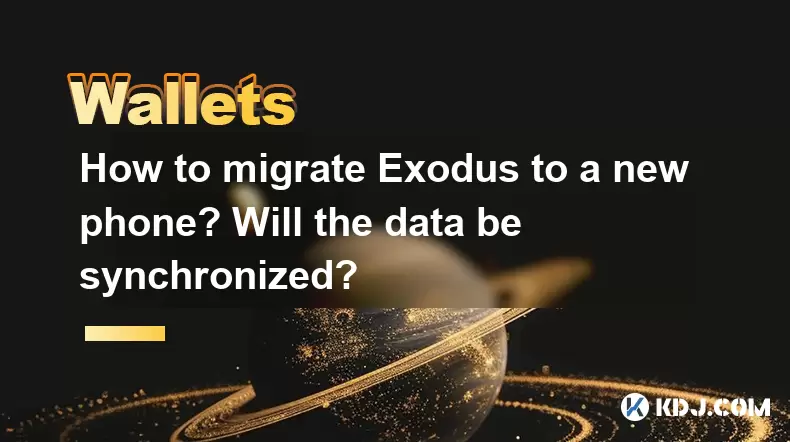
How to migrate Exodus to a new phone? Will the data be synchronized?
May 11,2025 at 03:28pm
Migrating your Exodus wallet to a new phone is a straightforward process that ensures your cryptocurrency data remains secure and accessible. This guide will walk you through the steps to successfully transfer your wallet to a new device, and address whether your data will be synchronized during the process. Preparing for the MigrationBefore you begin t...
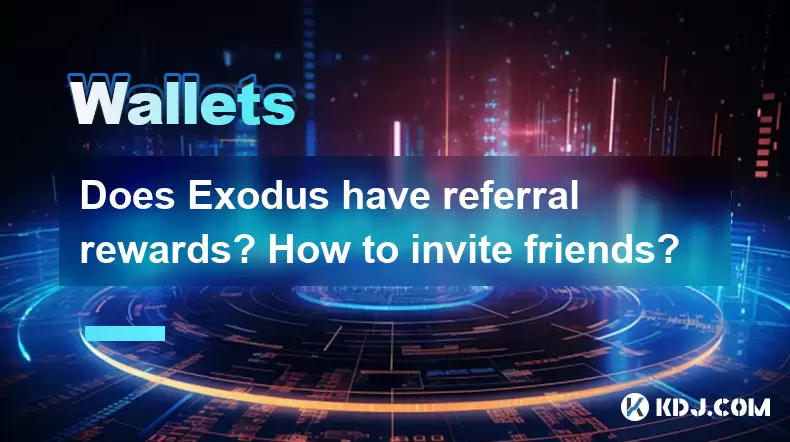
Does Exodus have referral rewards? How to invite friends?
May 09,2025 at 10:01pm
Does Exodus have referral rewards? How to invite friends? Exodus, a popular cryptocurrency wallet, has gained a significant user base due to its user-friendly interface and robust features. One common question among users is whether Exodus offers referral rewards and how to invite friends to join the platform. In this article, we will explore these topi...
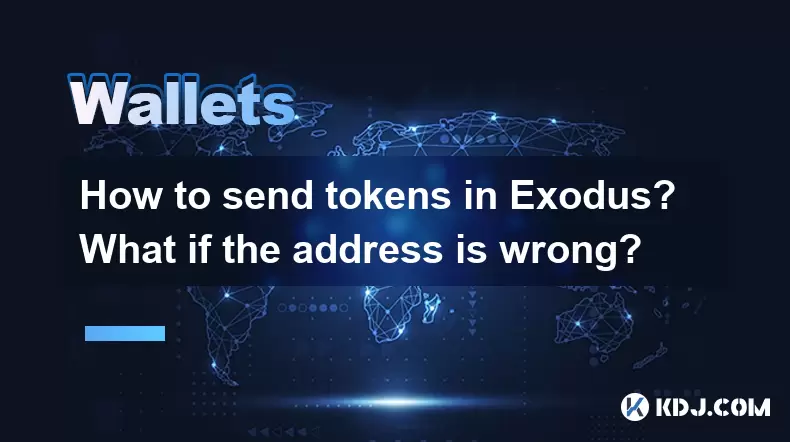
How to send tokens in Exodus? What if the address is wrong?
May 11,2025 at 07:35pm
Sending tokens in Exodus can be a straightforward process if you follow the correct steps. However, it's crucial to be cautious, especially when entering the recipient's address. This guide will walk you through the process of sending tokens in Exodus and what to do if you mistakenly enter the wrong address. Preparing to Send TokensBefore you begin send...
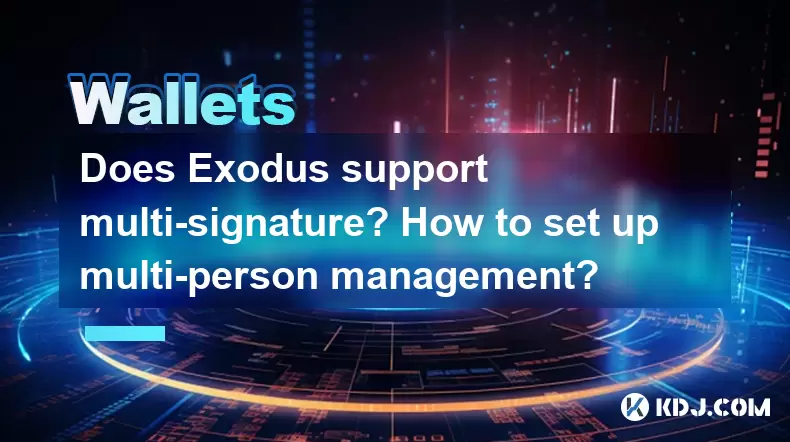
Does Exodus support multi-signature? How to set up multi-person management?
May 11,2025 at 12:01am
Does Exodus Support Multi-Signature Wallets?Exodus, a popular cryptocurrency wallet known for its user-friendly interface, does not currently support multi-signature wallets. Multi-signature (multi-sig) wallets are a type of wallet that requires more than one private key to authorize a transaction, enhancing security by requiring multiple parties to agr...

How to clean the Exodus cache? Will it affect the wallet data?
May 11,2025 at 12:49pm
Cleaning the cache in the Exodus wallet is a routine maintenance task that can help improve the performance of the application. However, many users are concerned about whether this action will affect their wallet data. In this article, we will guide you through the process of cleaning the Exodus cache and explain why it does not impact your wallet data....

Does Exodus support DeFi? How to connect to decentralized applications?
May 10,2025 at 08:36pm
Does Exodus Support DeFi? How to Connect to Decentralized Applications? Exodus is a popular cryptocurrency wallet known for its user-friendly interface and support for a wide range of cryptocurrencies. However, one of the frequently asked questions among users is whether Exodus supports DeFi (Decentralized Finance) and how to connect to decentralized ap...

How to migrate Exodus to a new phone? Will the data be synchronized?
May 11,2025 at 03:28pm
Migrating your Exodus wallet to a new phone is a straightforward process that ensures your cryptocurrency data remains secure and accessible. This guide will walk you through the steps to successfully transfer your wallet to a new device, and address whether your data will be synchronized during the process. Preparing for the MigrationBefore you begin t...

Does Exodus have referral rewards? How to invite friends?
May 09,2025 at 10:01pm
Does Exodus have referral rewards? How to invite friends? Exodus, a popular cryptocurrency wallet, has gained a significant user base due to its user-friendly interface and robust features. One common question among users is whether Exodus offers referral rewards and how to invite friends to join the platform. In this article, we will explore these topi...

How to send tokens in Exodus? What if the address is wrong?
May 11,2025 at 07:35pm
Sending tokens in Exodus can be a straightforward process if you follow the correct steps. However, it's crucial to be cautious, especially when entering the recipient's address. This guide will walk you through the process of sending tokens in Exodus and what to do if you mistakenly enter the wrong address. Preparing to Send TokensBefore you begin send...

Does Exodus support multi-signature? How to set up multi-person management?
May 11,2025 at 12:01am
Does Exodus Support Multi-Signature Wallets?Exodus, a popular cryptocurrency wallet known for its user-friendly interface, does not currently support multi-signature wallets. Multi-signature (multi-sig) wallets are a type of wallet that requires more than one private key to authorize a transaction, enhancing security by requiring multiple parties to agr...
See all articles





















































































